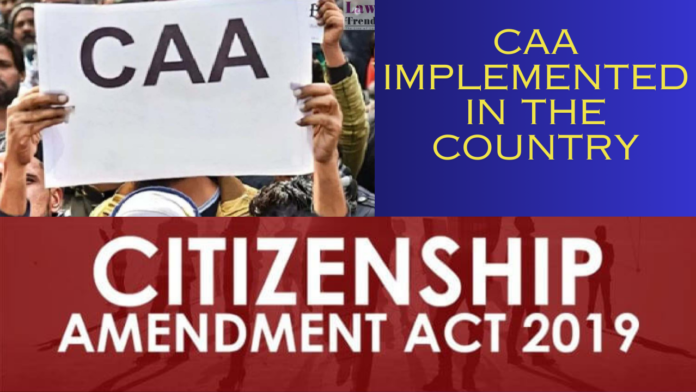Before the announcement of the dates of the upcoming Lok Sabha elections, the Modi government has issued the notification of the Citizenship Amendment Act (CAA) in the country. Let us tell you, it has been almost 5 years since CAA (Citizenship Amendment Act) was passed by the Parliament. But now the Central Government has taken a big decision and step and implemented CAA in the country. Now CAA i.e. Citizenship Amendment Act will be implemented in the country from today itself. Under this law, now displaced minorities from three neighboring countries will get Indian citizenship. However, for Indian citizenship they will have to apply in the online portal prepared by the Government of India
Table of Contents
CAA Benefits: Minorities from 3 Muslim countries will get citizenship in India

Let us tell you, the Citizenship Amendment Act (CAA) was amended by the PM Modi led central government in the year 2019. Under this law, a provision was made to give Indian citizenship to 6 minorities (Christians, Hindus, Jains, Sikhs, Parsis and Buddhists) from three countries (Pakistan, Bangladesh and Afghanistan) who came to India before December 31, 2014. According to the rules of law, the right to grant citizenship to
all the minorities coming to India from these three countries will be in the hands of the Central Government.
What is CAA law and its provisions:
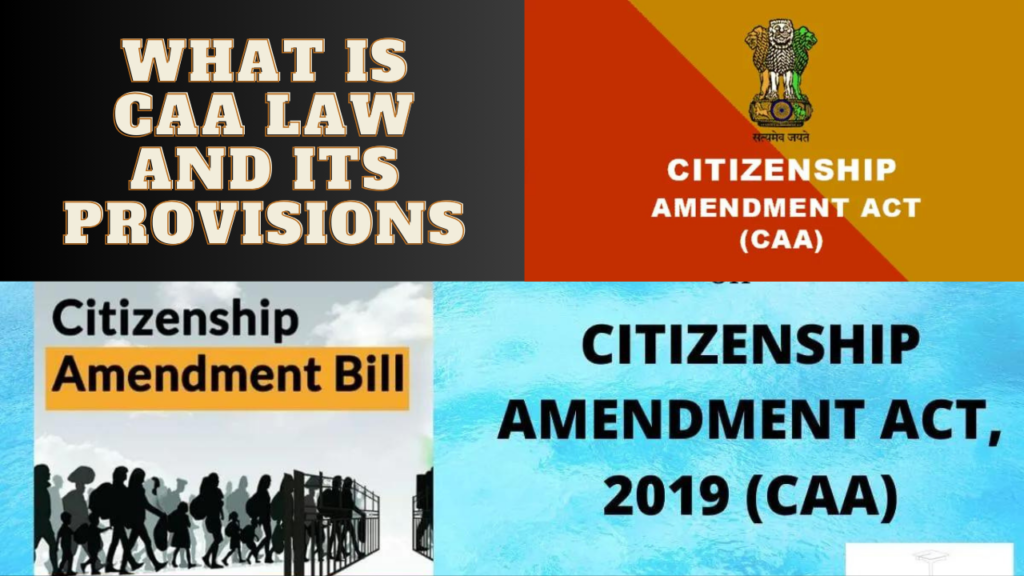
Let us tell you, in CAA (Citizenship Amendment Act) there is a provision to give citizenship in the country to people of other religions except Muslim citizens of three neighboring countries of India. Regarding this law, the Central Government has prepared a web portal in which they (minorities of the three countries) will have to apply. They will have to register in this portal. And after their registration, they will be investigated by the government and after that they will be given Indian citizenship. Along with this, the displaced minorities coming from these three Muslim countries (Bangladesh, Pakistan and Afghanistan) will not be required to provide any documents.
Wich States Will Give The Citizenship?

Let us tell you, under the Citizenship Act 1955, people of Sikh, Jain, Parsi, Hindu, Christian and Buddhist religions coming from Bangladesh, Pakistan and Afghanistan have been sent to the Magistrates and Home Secretaries of more than 30 districts in 9 states of the country in the last two years. Powers to grant Indian citizenship have been given. According to the annual report of the Home Ministry for the year 2021-22, about 1414 foreigners from non-Muslim minorities of Bangladesh, Pakistan and Afghanistan have been given Indian citizenship from 1 April 2021 to 31 December 2021. The nine states in which citizenship has been given to non-Muslim minorities from Bangladesh, Afghanistan and Pakistan include Chhattisgarh, Haryana, Madhya Pradesh, Uttar Pradesh, Maharashtra, Delhi, Punjab, Gujarat and Rajasthan.
When was the Citizenship Amendment Act passed?
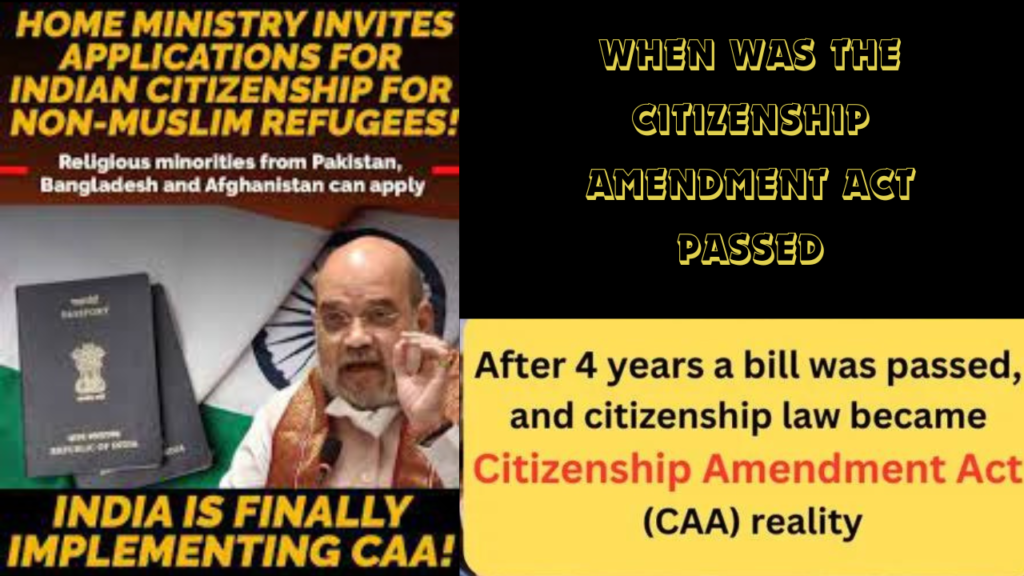
For information, let us tell you that the Citizenship Amendment Act i.e. CAA was passed in the month of December in the year 2019. After that the President of the country gave his approval to this law. But after that, protests against CAA started taking place in different parts of the country. But the central government could not implement this law till now. In fact, necessary rules need to be notified to implement it. So this was the reason due to which this law could not be implemented.
Home Minister's statement about the Citizenship Amendment Act:

Country’s Home Minister Amit Shah said regarding the Citizenship Amendment Act that no one will be able to stop this law from being implemented. This is a law made by our country which will be applicable to everyone. In such a situation, now CAA will be implemented across the country. This statement of Home Minister Amit Shah is also being termed as election campaign because now Lok Sabha elections are going to be held.
Mamata Banerjee's reply on CAA:
Where the Home Minister of another country is saying that now no one can stop the implementation of CAA. On the other hand, West Bengal Chief Minister Mamata Banerjee has called it an election campaign of BJP. Mamta Banerjee said that first let me see all the rules of the Citizenship Amendment Act once. Notification has not been issued yet, so if citizens are deprived of their rights through these rules, then we will definitely fight against it. This is just an election campaign of the Bharatiya Janata Party and has no validity other than that.
If seen, the Central Government has issued a notification regarding the Citizenship Amendment Act at the time of elections. Now all kinds of things are being said about it, some are calling it a way of election campaign and some are calling it something else. But nothing can be said about it right now. It remains to be seen whether CAA will be implemented in India or not because even before now there were strong protests against it.
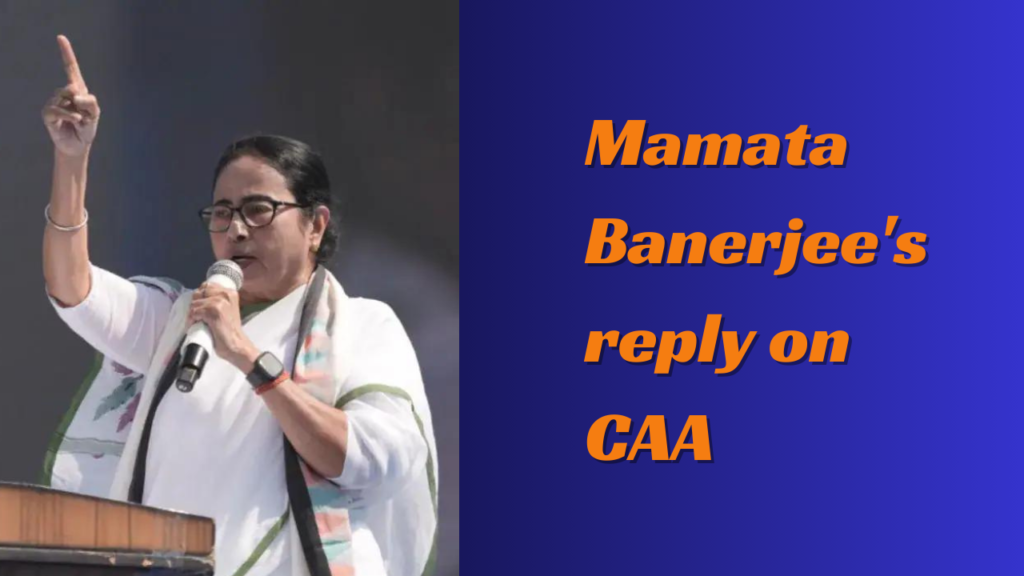
Who will benefit most from CAA?
While presenting the CAA bill in the Rajya Sabha, Union Home Minister Amit Shah had called it a new ray of hope for religious minorities. He had said that the purpose of CAA is to give Indian citizenship to people who have suffered religious persecution for decades and an opportunity to live a respectable life. The minority communities of Pakistan, Bangladesh and Afghanistan will benefit the most from this.

Why were only the minority communities of Pakistan, Bangladesh and Afghanistan included?
While presenting the bill in 2019, Home Minister Amit Shah had given a statement in the House on this question – ‘Earlier, at different times, refugees from countries like Uganda, Sri Lanka have been given citizenship. Then Pakistan, Bangladesh and Afghanistan were not included. This time, through CAA, it has been considered to give citizenship to immigrants from three countries who came to India due to religious persecution.

Why were Muslims not included in this?
A major reason for opposing CAA was that Muslims have not been included in it. The government says that Muslims were not included because they do not face religious persecution in these Islamic countries. Official figures testify to the large-scale migration of minorities from Muslim-majority neighboring countries.
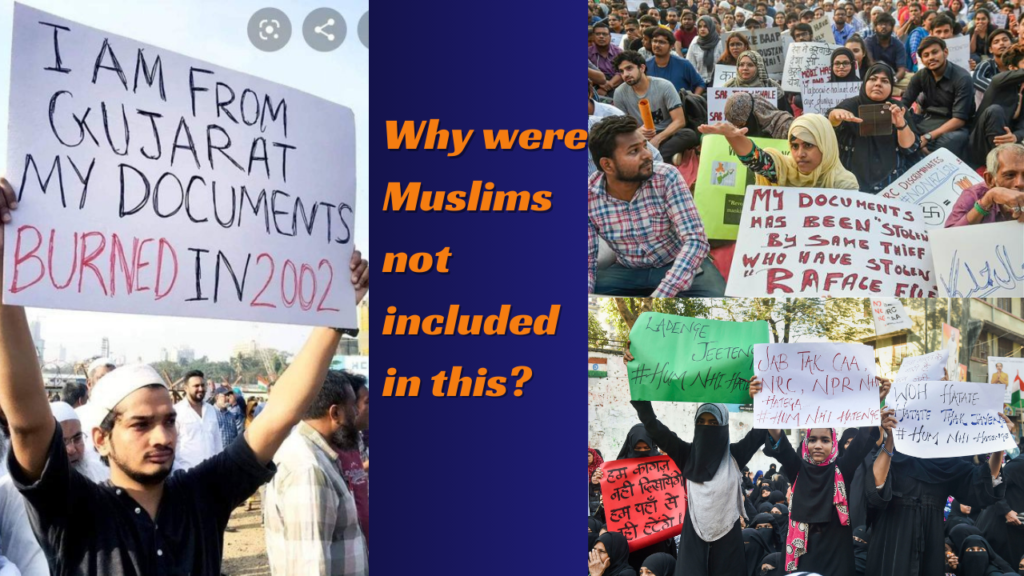
Time limit fixed for getting citizenship:
It is not that any person who came illegally can become an Indian citizen through CAA. Non-Muslim minorities who came to India illegally from Pakistan, Bangladesh and Afghanistan after December 31, 2014, will not be given citizenship. These illegal immigrants will thus be given citizenship on a one-time basis. After this, if anyone wants citizenship, he will have to follow the process of Citizenship Act of 1955.
What exemption will minorities get in acquiring citizenship?
The CAA Act allows immigrants from three countries to acquire citizenship through naturalization. In the naturalization method, a person has to fulfill certain qualifications such as the person must have resided in India for at least 11 years in the last 12 months and the last 14 years or must have been in the service of the Central Government. The Citizenship (Amendment) Act, 2019 has reduced the period of residence of illegal immigrants in India from 11 years to 5 years.
How different is Modi Government's CAA 2019 from the Citizenship Amendment Act of previous governments?
Union Home Minister Amit Shah had said in Rajya Sabha that the previous UPA government had given citizenship to only 13000 Hindus and Sikhs, whereas the Modi government is giving citizenship rights to 6 persecuted minorities including Hindus and Sikhs. He also told that in the last 5 years, more than 560 Muslims from Pakistan, Bangladesh and Afghanistan have been given citizenship.
Does CAA threaten the citizenship of any Indian?
Under the Citizenship Act, victims from other countries will be given Indian citizenship. CAA will have no effect on the citizenship of any citizen of India, irrespective of their religion. Amit Shah had also stressed on this and said, ‘The purpose of this is not to take away anyone’s citizenship but to give citizenship.’
Where will CAA not be implemented in the country?
Even though CAA has been implemented at the national level, it will not be applicable to some areas of the country. These are: (i) the tribal areas of Assam, Meghalaya, Mizoram and Tripura included in the Sixth Schedule of the Constitution, and (ii) those states which are controlled by “Inner Line” Permit under the Bengal Eastern Frontier Regulation 1873. Inner Line Permit regulates travel of all persons including Indian citizens to Arunachal Pradesh, Mizoram and Nagaland.
How can Muslims coming from abroad get citizenship?
The matter of Indian citizenship comes under the Ministry of Home Affairs. Under the Citizenship Act of 1955 (amended in 2003), a person can acquire Indian citizenship in four ways. For example, on the basis of birth and descent, that is, if one of the parents is an Indian citizen, their child can get Indian citizenship. Apart from this, citizenship can be acquired through naturalization and registration.
What will happen after becoming a citizen?
After applying for citizenship, a person has to take an oath of allegiance to the country, in which he declares that he will “bear true faith and allegiance to the Constitution of India as established by law” and that he will “faithfully obey the laws of India.” and “fulfil” his duties as a citizen of India.
